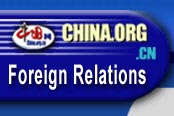China persists in a peaceful, independent foreign policy and has always regarded disarmament and arms control as major components in the effort to safeguard world peace. In the past year, China continued to play an active role in international arms control and disarmament activities and made contributions to furthering the progress of international arms control and disarmament.
China takes a clear-cut stand in opposing the U.S. NMD system. The leaders of China and Russia issued a joint declaration in July that displayed the resolute position of the two countries regarding the anti-ballistic missile issue. At the 55th United Nations General Assembly, China, as one of the sponsor countries of the resolution regarding the anti-ballistic missile issue, contributed to passing the resolution on safeguarding and observing the ABM Treaty. At the Sixth Conference on Deliberation of the Non-Proliferation Treaty, China took the whole situation of safeguarding the international nuclear non-proliferation system into account and actively promoted the adoption of the final documents. China displayed the necessary flexibility and made great contributions to the success of the conference.
China has also made practical efforts to support international non-proliferation. To date, China has signed all the legal documents regarding international non-proliferation and continually improved export control systems on relevant products and technologies. China indicated clearly in November that it would not help any country develop ballistic missiles capable of transporting nuclear weapons, and will further improve export controls over missile-related goods. In addition, China has established an arms control and disarmament consultation system with other countries to good effect. It has eliminated skepticism, while increasing trust and understanding between China and those countries.
Arms control and disarmament are favorable to world peace and in the interests of all countries. Progress in arms control and disarmament cannot be achieved without the joint efforts of all countries based on the premise of universal security for these countries. Looking ahead, only when various countries cooperate sincerely on an equal footing and consider the concerns of others, can new progress in international arms control and disarmament be achieved. In this way, the world will become more peaceful and secure. If any country attempts to take advantage of arms control and disarmament to weaken other countries and seek a unilateral security advantage, this will only obstruct progress in international arms control and disarmament and, in the end, threaten its own security interests.
(1) How the U.S. government acts regarding the NMD issue will be a focus of concern in 2001. NMD deployment will undermine the global strategic balance and stability and severely hinder the international nuclear disarmament. It may even spark a new arms race, which is not in the interests of any country. This is the universal consensus of the international community. The only possible and efficient way is to remove the missile threat through political and diplomatic means. We expect that the new U.S. government will weigh the pros and cons carefully and make a sensible judgment.
(2) The acceleration of progress in nuclear disarmament by the United States and Russia is what all the peace-loving people want. Russia has made an encouraging proposal regarding nuclear disarmament. But the realization of this proposal depends first on the United States abandoning NMD deployment because Russia has made it clear that Russian disarmament is linked with the fate of NMD. If the United States insists on NMD deployment, Russia will not only abandon its nuclear disarmament, but also withdraw from the existing arms control treaties. How Russia acts will have an impact beyond Russia and the United States. Since the end of the Cold War, the international situation has undergone tremendous changes, but the U.S. nuclear strategy remains unchanged. If the United States wonĄŻt change its current nuclear strategy, progress in Russian-U.S. bilateral disarmament will be severely obstructed.
(3) The only way to break the current deadlock in multilateral arms control is to treat the just security concerns of all countries equally. Since the signing of the CTBT in 1996, the Conference on Disarmament has been dormant for four years. Whether or not the CD will emerge from deadlock is an issue of universal concern. At present, disputes concerning plans of the CD reflect the different views regarding disarmament priorities and the security concerns of different countries. Each country is an individual member of the international community, and the security of every country is equally important and thus should be respected. Only in this way can lasting and healthy development in international arms control and disarmament be insured.
Humanity has entered the 21st century. Arms control and disarmament achieved glorious successes and made great contributions to the peace and development of human society in the past century. In the new century, arms control and disarmament will assume more important and glorious responsibilities and face unprecedented pressure and difficulties.
We believe that a stable and peaceful world will come about only if the peace-loving people of the world work together. China will, as before, work with all members of the international community and make unyielding efforts.
(Beijing Review No.1 Jan.4,2001)
